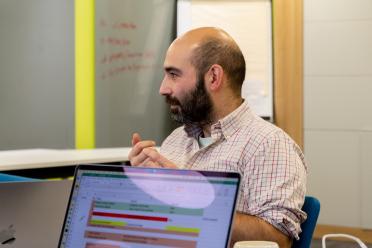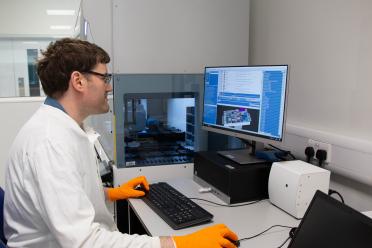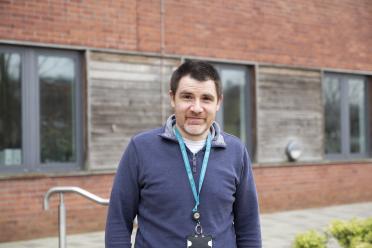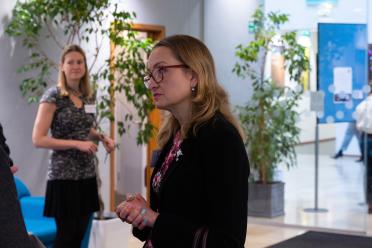Standout innovation contributes to knowledge exchange
It is not always easy to translate academic research into real-world impact but, this year, Earlham Institute researchers have stood out for their positive contributions.
Whether it is opening up the world of genetics to agritech providers, plans to improve the world’s access to food, or working with major companies to exchange best practice, the Institute’s staff have been making their mark.
We heard from project leaders applying their research at the Innovation Showcase during EI Innovate on 16 November to share real-world successes of our researchers in entrepreneurship, innovation and creating partnerships.
This year saw the founding of the first spin-out company from the Earlham Institute.
TraitSeq applies cutting-edge artificial intelligence (AI) to accurately predict complex agricultural traits, for the development of high-yielding and climate-resilient crop varieties, animal breeds, agrochemical and biological inputs, and gene edits that are critical to global food security and sustainable food production.
The technical basis for TraitSeq was developed during Joshua Colmer’s PhD project at the Earlham Institute, which was funded by the Biotechnology and Biological Sciences Research Council (BBSRC), part of UKRI, through an Industrial CASE Award supervised by Professor Anthony Hall at the Earlham Institute.
The Earlham Institute licensed the Intellectual property in TraitSeq to TraitSeq Ltd which became the first spinout company from the Earlham Institute in November 2023.
Using cutting-edge machine learning methods to generate biomarkers using transcriptomic data opens up potential to predict changes in phenotype, physiology, or metabolism under varying environmental conditions.
Joshua Colmer, CEO and co-founder of TraitSeq, says their mission is to revolutionise agriculture.
“This is the platform where agritech companies can meet powerful and easy-to-access tools for predicting and understanding complex traits in crops,” he says.
TraitSeq was initially designed to predict the presence of plant diseases and the circadian clock in plants but is also applicable to human or livestock trait prediction, opening up future avenues for exploration.
Next steps for TraitSeq include completing pilot projects and exploring applications with agritech companies.

These opportunities enable our researchers to develop their connections outside of academia, help broaden their career options, attract additional funding for their research, and translate research into real-world impact.

Dr Liliya Serazetdinova, Head of Business Development and Impact

Earlier this year, Dr Jose De Vega became one of the research institute leads in the €8.6m Horizon-funded Legume Generation consortium. This international project, supported by more than 20 industry partners, is boosting European innovation in breeding for six legumes - soybean, lupin, pea, lentil, common bean, and clover.
Legume Generation is intended to reduce the European protein deficit by boosting plant breeding to make legumes more productive and profitable for European farmers.
The Institute will be integrating data from field trials and genetic markers, extracting new insights and making them accessible online. Breeders and stakeholders will be able to use them to make decisions in their breeding plans.
“Legumes only account for 2-3 per cent of crops in Europe,” says Dr De Vega. “They’re not as profitable as cereals. This means there hasn’t been the same investment and yield improvement due to breeding and genomics as in other crops, and farmers are less likely to grow them.
“However, climate change means we’ll all have to change the way we eat. Legumes are a cheap and easily grown source of protein, much less costly to the environment than meat.
“Where most crops deplete the soil of nutrients, legumes, including forages such as clover, fix nitrogen and enrich poor soil. Growing them in rotation with cereals will make for more sustainable farming practices, while also increasing diversity and providing valuable ecosystems for pollinators.”
The project began in September 2023 and is running to February 2028.

Senior Scientist Dr Thomas Brabbs and Senior Research Assistant James Lipscombe, both from the Genomics Pipelines group, worked with leading lab automation company SPT Labtech in Cambridgeshire.
The two were working on the Firefly robot, designed for all-in-one liquid handling. This allows users to improve the consistency of their experiments while also reducing hands-on time. They wanted to test a miniaturised sample preparation method for DNA sequencing.
The collaboration was funded by a Flexible Talent Mobility Account (FTMA) grant from BBSRC, designed to promote exchange of knowledge and skills.
“We wanted to see research and development in a private company setting,” says Dr Brabbs. “It was extremely useful. They had different priorities, such as considering potential markets and whether investment would pay off, and we took away several ideas to improve our own work.
“We were able to do a validation run on Firefly. LITE 2 allows for far smaller quantities of DNA and reagents to be used, so it’s more cost effective. The performance was comparable to the full volume version of the sample preparation method."
Dr Brabbs and Lipscombe visited the company for a week and a half, using the time to work on a new workflow and contribute towards product development, before running a webinar on the results of the miniaturised run.
They used the outcomes of the FTMA to further miniaturise the method while maintaining its performance. It has been released as a pipeline called LITE 2, available as a service for low cost and input DNA sequencing.

Dr Liliya Serazetdinova, Head of Business Development and Impact at the Earlham Institute, said: “A culture of innovation is critical in publicly-funded research organisations.
"We are encouraging our researchers to participate in activities that will help them to build a better understanding of the industrial challenges, work collaboratively with our stakeholders on developing solutions, explore entrepreneurship through programmes like ICURe, participate in staff exchange programmes like FTMA, and commercialise their research via a spin-out or other routes.
"These opportunities enable our researchers to develop their connections outside of academia, help broaden their career options, attract additional funding for their research, and translate research into real-world impact.”

The outstanding work and entrepreneurial spirit demonstrated by each of the researchers was recognised with Earlham Institute Knowledge Exchange and Commercialisation awards.
“There are not many formal ways to recognise individual contributions and efforts towards increasing innovation, entrepreneurship or knowledge exchange,” said Dr Serazetdinova.
“However, at the Earlham Institute, we are striving to encourage staff to engage in these activities, provide them with support through our Business Development and Impact Team, and celebrate their successes through internal awards like these.”